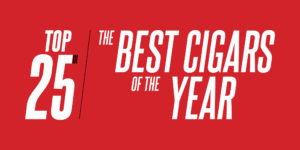Behind every cigar there are countless people who contributed to the flavor, look, feel, and experience of smoking it. Some of them have their best years ahead of them and will be influencing the contents of your neighborhood humidor for decades to come. This ongoing series of profiles will bring you closer to cigar makers, tobacco growers, and master blenders with staying power.

There’s no big sign outside announcing that you’ve arrived at the right place. The only mention of who occupies the space is on the front door, which is largely hidden from view by trees and shrubs when you drive by. It’s an unassuming office in an unassuming location; Doral, Fla. is a semi-industrial warehouse suburb of Miami.
That’s just the way David Pérez likes it. Unless you’ve joined the ranks of the geekiest smokers, chances are you’ve never heard of ASP Enterprises. Rest assured, though, you’ve almost certainly smoked (and enjoyed) their tobacco.
“If you go into a cigar shop, probably 8 out of 10 cigars will have something of ours in them,” said Pérez during an interview in his office. He’s so matter-of-fact in his delivery, it takes a moment for it to sink in what a big freaking deal that statement is.
Like so many other cigar industry players, ASP has humble beginnings. The company was started by its namesakes, David’s father Alfredo, and grandfather Silvio Pérez. The family’s history in tobacco goes back as far as David’s great-great-grandfather José Pérez, whose farm, La Pequeña Cabaña, was in San Antonio de los Baños (about 25 miles outside of Havana). Fidel Castro’s revolution sent the Pérezes down an unpredictable path. After revolution pushed them out of Cuba, Alfredo was working as a butcher and Silvio was washing cars in Miami. That all changed thanks to a new opportunity from one of the United States’ tobacco leaders.
“There was the embargo with Cuba, so Edgar Cullman, Sr. (the late president, chairman and CEO of General Cigar Company), who owned farms in Connecticut, was looking for someone who could actually cure tobacco the way they did the candela wrapper in Cuba,” said Pérez. He still points to the Cullman family as playing one of the most important roles in his tobacco education. “They told him there were two Cubans in Miami who knew how to do it.”
Alfredo and Silvio ended up in Connecticut (where David was born), working to help the Cullmans develop alternatives to Cuban tobacco, before eventually moving on—David in tow—to their own farms in Nicaragua. Today, David sits at the helm of the tobacco juggernaut his family built, armed with the wisdom and passion he’s inherited from the old-school tobacco men of his family, but also with the skills that come from earning a business degree and coming just short of a law degree (he shifted all his focus to ASP when he was 29 credits short of a J.D.). But his tobacco life started early; he grew up in the industry, exposed early on to the world of tobacco farms, curing barns and cigar factories. He recalls standing on rolling tables at the Padrón factory when he was 3 years old, when he called José Orlando Padrón “Papi Padrón.”
“When I was 2 or 3 years old, my parents would take me to the farm in Nicaragua when they were doing the crossbreeding for the hybrid seeds for the wrapper that they used to grow in the ‘70s,” he said. “I don’t remember any of it, but that’s the beginning of where I started with tobacco. I was 14 when my dad said, ‘Do you really like tobacco?’ I said I thought so. And he sent me back up to Connecticut, where I went to camp with boys from Pennsylvania and actually harvested tobacco from the ground up for three months (on the Cullmans’ farm).”
The elder Pérezes encouraged David not to go into the tobacco business. He got a business degree and went to law school. But just before getting his J.D., he decided to leave school and start working at ASP.
“The company has gone through a large growth from when I started. There was the cigar boom, as they called it, that began in about ‘93 or ‘94. In 1992, though, when we would go to the cigar conventions, everybody was in a bad mood,” he said, recalling the malaise he saw in the premium cigar world before sales picked up.
The business saw its biggest growth in the years leading up to Alfredo’s death. Since 2004, David says, ASP has had a firm hold on its position as one of the world’s leading tobacco growers, but it’s tough to see dramatic growth from here (not that they need it). What’s more, the tobacco is in such high demand that just about everything growing on the Pérez farms (2,300 acres in Ecuador and Nicaragua alone) is destined for a particular customer before it’s planted.
Another thing the company has going for it is the fact that it’s been growing tobacco from the same seed strain they started growing in 1971—developed by Alfredo and Silvio themselves. “It would be like a recipe for someone who has the best spaghetti sauce in the world,” said David. “That seed is our recipe. And that’s what makes us different, that’s what makes us better.”
David credits his father and grandfather as the sources of some of the key values that still drive him in his role at ASP today.
“My grandfather believed that you need to be organized to be able to run a company and you need a passion for growing tobacco, so the sense is the growing comes first, then you have to be organized to be able to deliver the commitments to keep your word so people trust in you,” David said. “My father always said, ‘We need to do this to help the 5,000 families that depend on us to make a living in Ecuador, Nicaragua, Peru, Mexico.’ I think I’ve kept their tradition, plus I’ve used my business education.”
As we walk from his office to the tobacco bales in the warehouse, we pass four cars that make David smile from ear to ear. When Alfredo was still alive, he’d tried to convince David to buy a new Corvette. “I approached it like a businessman, though,” said David. “I knew these depreciate in value as soon as you drive them off the lot.” David thought a classic ‘Vette would retain more of its value. But when Alfredo died in 2004, David caved, splurging on a newer Corvette. Soon thereafter, David got a deal he couldn’t pass up on a ‘66 Corvette. Now both—the toy Alfredo pushed for and the collector’s investment David wanted—share a home with the family’s tobacco.
The third is a large van that the family used when riding with Silvio, who needed that kind of transportation to accommodate his wheelchair. Finally, there’s the Cadillac sedan that Alfredo left behind. The Pérezes still take it out from time to time, riding around Miami listening to the very same mix of CDs that Alfredo left in the changer.
“There’s all kinds of stuff in there. He liked a variety of music,” says David, surveying his collection for what seems like the first time, but must be the thousandth.
You might never see their name on cigar boxes, and David’s not one of the tobacco celebrities on the promotional herf circuit. But make no mistake; ASP is as sustainable and influential as they come in the cigar world. David learned from the very best and feels strongly about preserving the legacy, so the family’s tobacco will be burning for decades to come.




